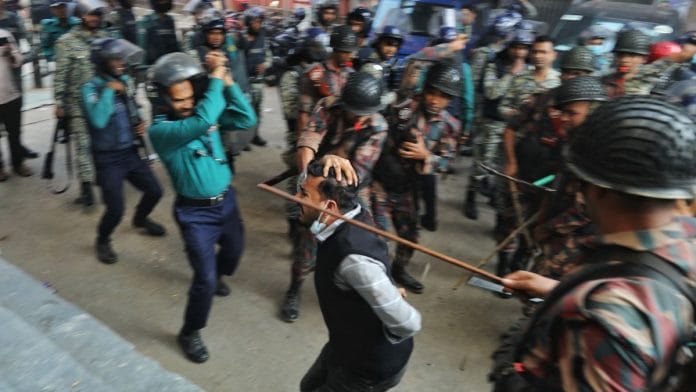In the wake of reports of attacks on Hindus and the vandalism of temples in Bangladesh, India’s foreign secretary, Vikram Misri, called on the Chief Adviser of Bangladesh’s interim government, Muhammad Yunus, and foreign affairs adviser Touhid Hossain. Misri discussed recent developments, conveyed India’s concerns—particularly regarding the safety and welfare of minorities—and raised incidents of attacks on cultural, religious, and diplomatic properties.
However, Dhaka’s response and priorities seem to differ. While voices condemning the attacks on minorities are muted, multiple statements have focused on punishing the deposed Prime Minister Sheikh Hasina and reviving the South Asian Association for Regional Cooperation (SAARC). While Dhaka cannot ignore the roadblocks created by Islamabad that hinder SAARC’s smooth functioning, its overtures to New Delhi for cooperation with Pakistan to revive the organisation are ridiculous, to say the least. New Delhi must urge Dhaka to prioritise BIMSTEC instead—or relocate its headquarters to Kolkata if Dhaka remains unwilling to fulfil its role. This would align with New Delhi’s ‘Neighbourhood First’ outlook, the ‘Act East Policy,’ and the ‘SAGAR’ vision, optimising South Asia’s connection with Southeast Asia.
A weak government in Dhaka, subservient to radical groups, Islamic fundamentalists, and forces inimical to India’s strategic and security interests, is a major challenge for India in the Indian Ocean Region and for stakeholders in the emerging Indo-Pacific region. For India, it is important that Bangladesh maintains strategic autonomy and upholds its secular-democratic credentials. The best way to achieve this is by ensuring a democratically elected government in Dhaka. India needs to nudge Dhaka toward elections.
While India does not support unilateral forcible intervention in any country, nothing prevents New Delhi from invoking the spirit of Responsibility to Protect (R2P). Adopted in 2005 at the UN World Summit, R2P requires countries to protect their populations, calls for international assistance to prevent genocide, war crimes, ethnic cleansing, and crimes against humanity, and mandates intervention if states fail in their duties. At the 76th UN General Assembly session in June 2022, Bangladesh’s UN representative emphasised the need to strengthen national institutions and mechanisms to tackle “atrocity risk.” Rabab Fatima, Bangladesh’s Permanent Representative to the UN, reminded the Assembly of its responsibility toward Rohingya refugees who fled Myanmar and highlighted the lack of progress in facilitating their return or ensuring accountability for crimes against them.
However, when it comes to attacks on Hindus, the current dispensation in Dhaka appears to be looking the other way. Bangladesh seems to exemplify a state unable to protect its minorities or a group of citizens targeted for their allegiance to the deposed prime minister and her party. Radical elements and hooligans, backed by a puppet regime that has usurped power, have taken advantage of this instability.
Also read: India-Bangladesh must rekindle old ties. Sheikh Hasina shouldn’t remain a thorn in the flesh
Measured response needed from New Delhi
In the early 1970s, Bangladesh—then East Pakistan—faced a similar situation under the military dictatorship in Islamabad. India’s military intervention led to the liberation of oppressed minorities, primarily the Bengali-speaking population, marking the occasion as Vijay Diwas. Sheikh Mujibur Rahman emerged as the undisputed leader of liberation and was revered. His daughter, Sheikh Hasina, inherited this legacy of democracy and secularism, evident in her strong policies against Islamic fundamentalism. Those who plotted her overthrow, accusing her of undemocratic practices, used radical elements to storm Dhaka and vandalise its institutions. Statues of Sheikh Mujib have been uprooted, and the foundational principles of democracy and secularism on which Bangladesh was established have been eroded.
Bangladesh is back to pre-1971 days, where radicals are seeking to eradicate democracy, minorities, and the rule of law. It is clear as daylight that the proxy head of state is a puppet manipulated by destabilising forces.
A Bangladesh mirroring Pakistan, which is ruled by the army and Islamic radicals, is not in New Delhi’s interests. The time to act is now. However, there is clamour among some angry circles for military intervention akin to 1971, but that is neither relevant nor necessary. India and Bangladesh share more than 4,000 kilometres of largely porous border. A 1971-type military action was only possible because the population was backing it fully. It had then needed extensive preparation and international community sensitisation. Today, such a thing could open the door for external involvement, pushing the region into the vortex of global military footprint.
What Dhaka truly needs is a political solution facilitated by general elections under UN observers. In 2008, the caretaker government led by Fakhruddin Ahmed called for elections that brought the Awami League-led coalition to power with 263 seats in the 300-member Jatiya Sangsad (Parliament). The Bangladesh Nationalist Party (BNP) won 30 seats, securing 32.5 per cent of the vote. Notably, since 1991, except during brief military and caretaker rule, Bangladesh has had only women prime ministers—Begum Khaleda Zia and Sheikh Hasina—both of whom lead cadre-based parties with substantial public support.
New Delhi should press the Yunus administration to announce a time-bound election process. The Awami League and the BNP are both capable of addressing the current crisis and ensuring Bangladesh returns to a stable, democratic path.
Seshadri Chari is the former editor of ‘Organiser’. He tweets @seshadrichari. Views are personal.
(Edited by Prashant)






